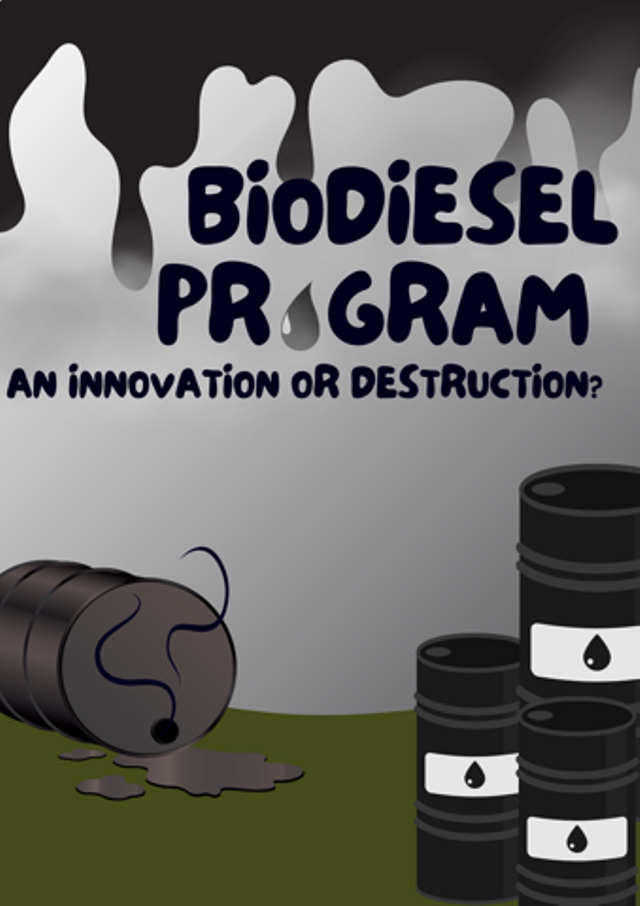Tentang KamiPedoman Media SiberKetentuan & Kebijakan PrivasiPanduan KomunitasPeringkat PenulisCara Menulis di kumparanInformasi Kerja SamaBantuanIklanKarir
2025 © PT Dynamo Media Network
Version 1.103.0
Konten dari Pengguna
Biodiesel Program: an Innovation or Destruction?
20 Oktober 2024 15:26 WIB
·
waktu baca 4 menitTulisan dari FISIPOL THINKERS CLUB UKI tidak mewakili pandangan dari redaksi kumparan

ADVERTISEMENT
On the 1st of February 2023, “The Energy and Mineral Resources Ministry of Indonesia” made and initiated a new program that is called the B35 biodiesel program. The B35 biodiesel program is where Indonesia mixes and combines biodiesel from palm oil with petroleum diesel with a 35-65% ratio. By continuing and implementing this program in Indonesia's environment, it helps Indonesia reduce its greenhouse gas emissions and further contribute to global efforts to combat climate change (Finaka & Syafira, 2023). However, since the B35 biodiesel program is projected to grow into B50 by 2025 and eventually is going to end up fossil-free biodiesel (Jong, 2023), one can argue that palm oil-based biodiesel is not a fully sustainable effort considering that palm oil plantations are land intensive and are associated with deforestation (Direktorat Jenderal EBTKE, 2023).
ADVERTISEMENT
Since Indonesia has significantly benefited from the growth of its palm oil industry, it is projected to grow at a Compound annual growth rate (CAGR) of 4.4% from 2024 to 2030 (Grand view research, 2023). This indicates that Indonesia’s palm oil industries are an essential aspect for Indonesia’s development. Furthermore, according to the World Bank, it states that “agriculture accounts for half of Indonesia's GDP, provides two-thirds of the employment, and approximately one-half of the nation's exports” (World Bank Group, 1974). Hence, as time continues the demand for palm oil in food, cosmetics, and biofuel industries will increase to meet the necessity of the government biodiesel program and also to meet the necessities of daily living goods for the increasing population in Indonesia.
ADVERTISEMENT
In essence, the high demand for palm oil and industrial requirements has resulted in a wide area loss of Indonesia’s rainforest at a concerning rate. While Indonesia is currently sitting at the number 1rank in palm oil exports, in 2023 Indonesia took an increase in palm oil production that could result in grave consequences for future generations and its natural wealth. Furthermore, Indonesia’s commitment to achieving net zero emissions and accelerating clean energy transition with the biodiesel policy has played a vital role in the increasing rate of deforestation in Indonesia.
The Energy and Mineral Resources Ministry of Indonesia’s new clean energy research program, the B35 Biodiesel Fuel, has prompted the Indonesian Government to indirectly administer the deforestation of Indonesia’s rainforest by opening lands of untouched rainforest for the necessity of developing palm oil plantations, in accordance with UU No. 41/1999 Chapters 27 and 29. By Indonesia committing to this program and with possibilities of future developments on biodiesel energy, this will be one of the threats to its ecological security. Several examples of those consequences include the loss of wildlife and biodiversity, pollution of groundwater, soil pollution, soil erosion, flooding, local weather alterations, and further embroiled climate change (Uryu Y. et al., 2008).
ADVERTISEMENT
Therefore, to address this issue, it’s crucial that companies involved in the palm oil industry commit and implement sustainable agricultural practices that are in line with the SDGs goal and regulation, including using environmentally friendly technologies and avoiding new land clearing in forests or peatlands. Companies also have to be transparent in the industry supply chain and collaborate with environmental organisations to reduce negative impacts on Indonesia’s ecology. As for the government, it needs tightening regulations and law enforcement related to oil palm plantations, including providing stricter supervision of land licensing and land clearing practices that damage forests. The government must also encourage the implementation of policies that support sustainability, such as Indonesian Sustainable Palm Oil (ISPO) or the Roundtable on Sustainable Palm Oil (RSPO), to ensure that oil palm production does not damage the environment. That communities be actively involved in natural resource management, as they can play a vital role in monitoring the practices of companies and governments. Additionally, communities can support sustainable products through awareness campaigns and by promoting local, sustainable agriculture, which can help reduce reliance on oil palm. Therefore, collaboration between communities, industries, and the government is crucial to minimising deforestation caused by oil palm plantations.
ADVERTISEMENT
Ditulis oleh Ministry of Research FTC :

